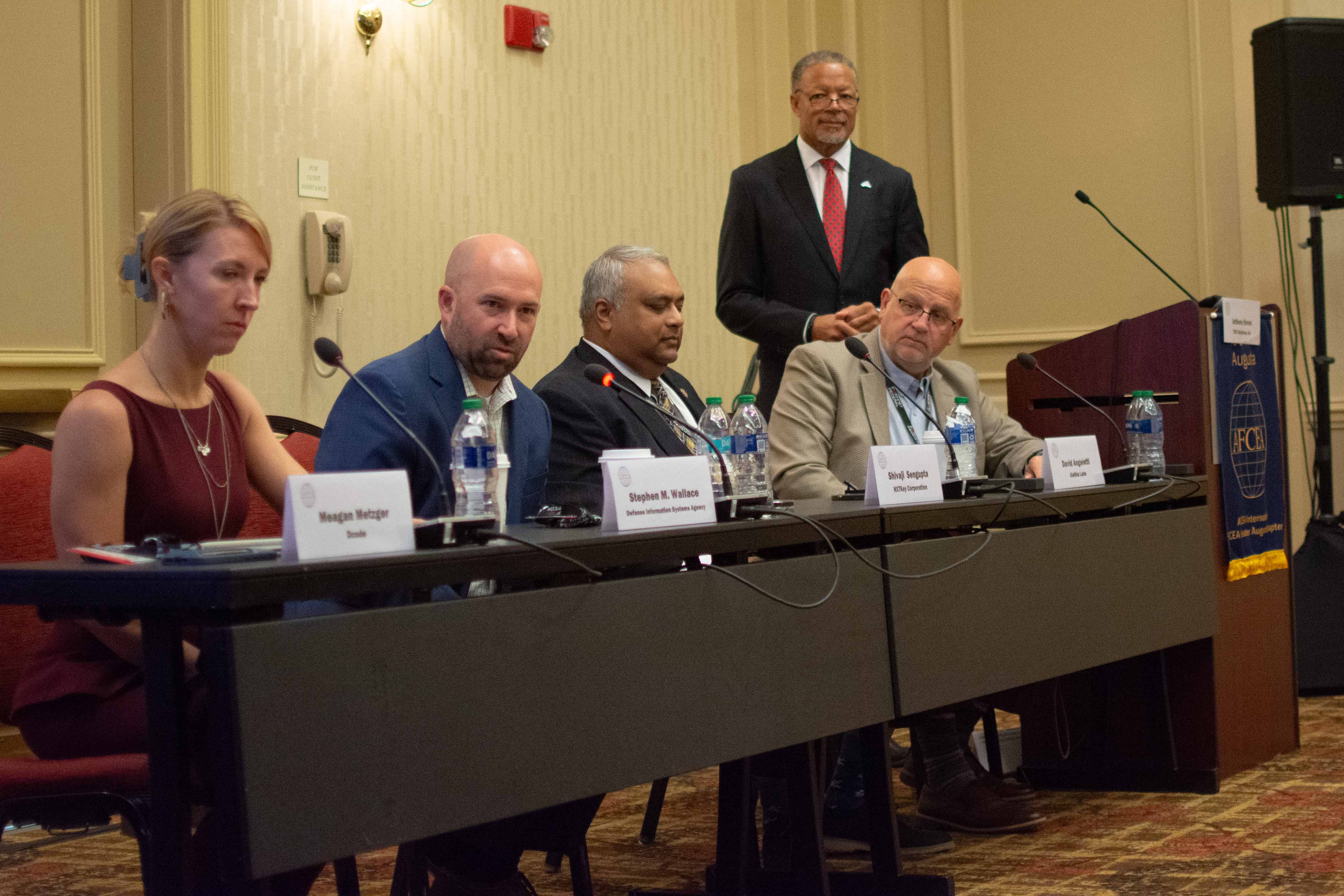A message to small businesses: Do your homework
By David Marin, DISA Office of Strategic Communication and Public Affairs
August 28, 2024

(DISA photo by David Marin)
Navigating interactions with government officials and prime contractors requires small businesses to be strategic and proactive. By understanding each party's roles and preparing thoroughly, small businesses can engage successfully and land contracts.
At last week’s AFCEA Small Business Workshop in Augusta, Georgia, Steve Wallace, DISA’s chief technology officer and director of the Emerging Technology Directorate, stressed the importance of research for small businesses seeking contracts.
The panel on “Emerging Technology Opportunities for Small Businesses in the Federal Government” began with a broad question: What is emerging technology? Wallace acknowledged how industry partners help identify upcoming trends, noting that “you can’t have a conversation without mentioning AI and Zero Trust,” but he quickly shifted focus to what he believes is more critical to the mission.
“It’s not always about finding the most emergent or exquisite technology,” he said. “It’s about how we appropriately apply the technology.”
Wallace explained that while the government often identifies and pursues new technologies, these innovations frequently end up shelved without a clear transition partner. This wastes time and funding, and it can lead to the government applying expensive or flashy tech in situations that don’t require such heavy solutions — benefiting no one and creating a reputation for “playing with toys” instead of delivering real capabilities.
“It’s more about delivering effectiveness and capability,” Wallace said. “It doesn’t necessarily have to be about tech. It can also be about process — just doing things better.”
When the discussion turned to finding the right agency for market entry, Wallace highlighted the advantages small businesses have.
“Bluntly, you all are far more maneuverable than a lot of others,” he said.
Before joining DISA, Wallace worked for a large integrator and noted that it had almost as much bureaucracy as the federal government. He emphasized that small companies are often more agile, adaptable and hungry. While partnering with larger firms is important, small businesses retain a significant advantage in maneuverability.
In terms of the wealth of data available on what DISA is buying, the problems it’s addressing, and its mission, Wallace said, “At DISA, we have a few ways of doing that. We publish our tech watch list each year. This year, we’re also going to release a series of challenge statements to be less technically prescriptive and more focused on general problems.”
For small businesses, understanding the needs of the organizations they approach and finding ways to collaborate is crucial, including contracting methods like Other Transactional Authorities, Commercial Solutions Openings, and Broad Agency Announcements.
“The beauty of OTAs is that they allow a lot more interactivity between us and the vendor community,” Wallace said.
When asked how small businesses can communicate with DISA, Wallace pointed to Carlen Capenos, director of DISA’s Office of Small Business Programs, and her team as key contacts.
“I work with her and her team quite closely,” he said. “They’ll get you exposure within the agency and let you know what’s coming.”
Wallace also addressed what small businesses should do if they have something to offer DISA but lack a top-secret security clearance. He stressed the importance of relationships with prime contractors, explaining that DISA has successfully worked with several companies that have never done business with the government, thanks to their relationship with a prime contractor
“It also depends on the scenario,” he said. “If the technology needs to scale and we need to put it on higher classification networks, that becomes more of a problem. But if it’s focused on lower classification work, we do that fairly frequently. But, to be blunt, you need a differentiator that sets you apart. Otherwise, if I have someone with a facilities clearance versus someone without, and they’re telling me the same story with similar tech, we’re probably going to favor the one with the facilities clearance.”
DISA is committed to seeing small businesses succeed. However, this requires small businesses to do their homework. If they follow Wallace's advice to build relationships with prime contractors, participate in technical forums, and collaborate with DISA's Office of Small Business Programs, they can greatly increase their likelihood of securing government contracts.
For more information about working with DISA, contact the Office of Small Business Programs.